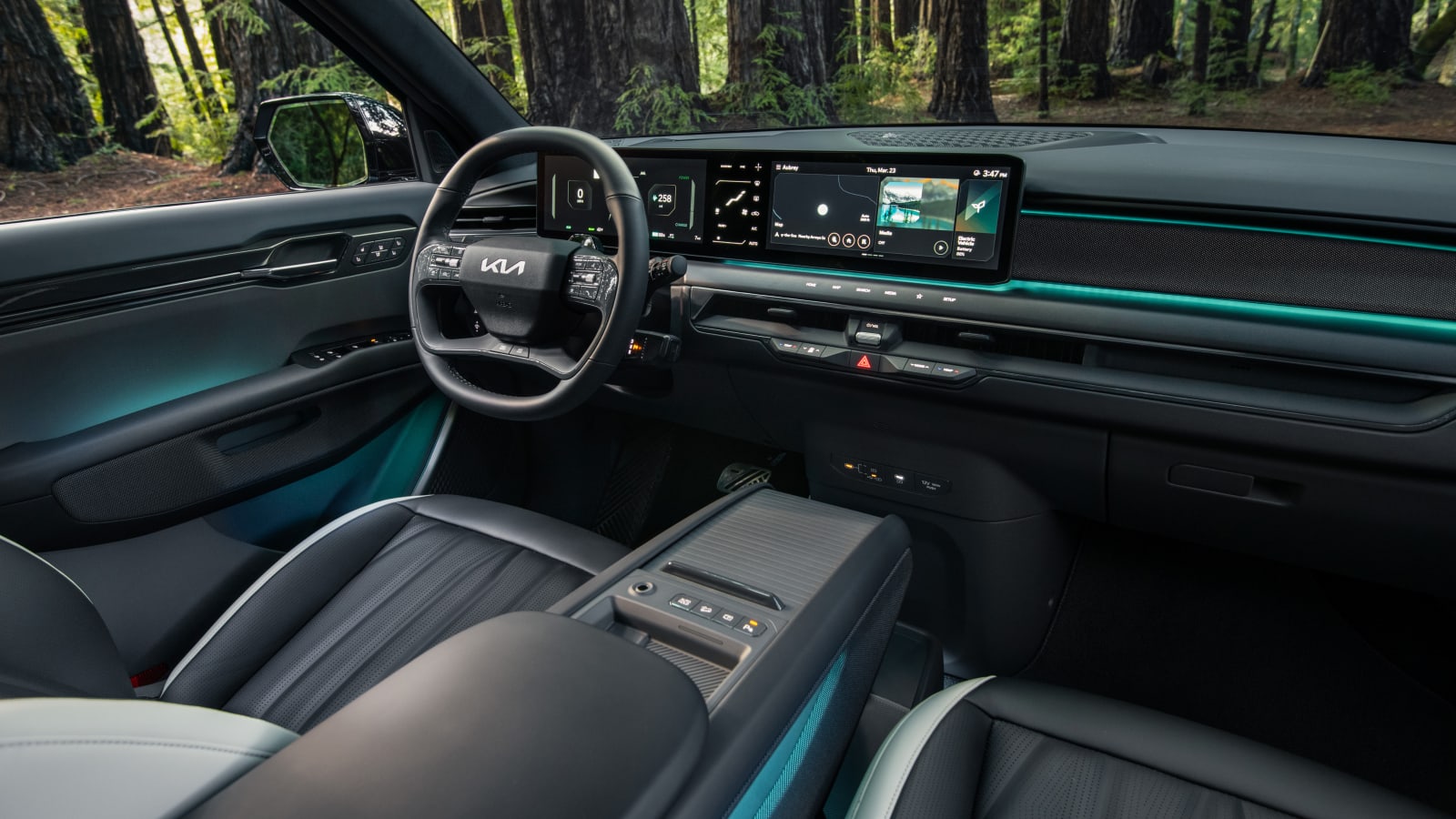Kia EV9 targets 300 miles of range, U.S. production at NY Auto Show

The 2024 Kia EV9 made its global debut just a short week ago, but now it’s here at the 2023 New York Auto Show, and Kia has U.S.-specific details to share with us about the three-row electric SUV.
Get the latest 2023 New York International Auto Show updates from our live blog.
Power figures in the U.S. differ slightly from what Kia previously stated during the global launch. Instead of the top-shelf dual-motor model starting with a base of 380 horsepower and 443 pound-feet of torque, it will output a combined 379 horsepower and 516 pound-feet of torque. Kia said the higher output version that we get as the standard dual-motor model would be available as an after-sales purchase or subscription for global markets. This dual-motor version is paired with a 99.8-kilowatt-hour battery pack. Kia says it’s targeting a 5.0-second 0-60 mph time and up to 5,000 pounds of towing capacity with this model. It also features torque vectoring to make it more fun to drive.
Nothing changes for the U.S. as it concerns the single-motor EV9 options. The Long-Range RWD version still comes with the big 99.8-kWh battery pack — Kia is targeting 300 miles of range with this model, but final EPA certification is not complete yet. The base model comes with a smaller 76.1-kWh battery pack and a single motor producing 215 horsepower. Range estimates for this model aren’t yet available.
Specs for charging the EV9 are also spelled out today. It will feature a maximum DC fast charging speed of 230 kW, which Kia says is good for a 10-80% charge in just 25 minutes. That charging speed is precisely what we expect from a car on the Hyundai Group’s E-GMP platform with 800-volt architecture. Level 2 charging will max out at 11 kW.
More intriguing specs concern cargo space, as Kia says the EV9 will offer 20.2 cubic feet of space with all three rows raised. That’s nearly identical to the Telluride’s figure of 21.0 cubic feet. With both rows folded, the maximum volume increases to 81.9 cubic feet, or 5.1 cubes less than a Telluride. We’ll still need to perform proper luggage tests to see how that space works in practice, but it’s safe to assume that if a Telluride works for your use case, an EV9 will, too.
Kia went in-depth on U.S.-specific tech options for the EV9 in NY, with the most intriguing details coming in the driver assistance offerings. There’s no talk of Kia’s Level 3 autonomy being made available in the U.S. any time soon, but the car will still be optionally fitted with the lidar and other sensors that Kia says will make “conditional Level 3 autonomy” possible. What is confirmed instead is a new version of its Highway Drive Assist, now named AHDA for “Advanced Highway Drive Assist,” that improves the system’s operation by using said lidar. This is complemented by a new Lane Following Assist 2 system that will help keep the EV9 centered in its lane better than previous systems. Remote Smart Park Assist 2 will be available as an option, allowing you to park your EV9 from outside the vehicle in a number of scenarios via the fob.

The last big tech item of note is a new generation of infotainment technology debuting in the EV9 that Kia calls Connected Car Navigation Cockpit or CCNC for short. This new tech will make the EV9 the first Kia with other-the-air update capability for vehicle systems. Most importantly of all, though, it will also house Kia’s first navigation system with EV route charging guidance. Up until now, the lack of a native route planner integrated with the car’s systems has been one of the biggest omissions from otherwise stellar Kia EVs like the EV6 and Niro EV. We can’t wait to get our hands on the route planner and test its mettle in the real world.
Initial U.S. sales will begin in the fourth quarter of 2023, and while production for the EV9 will begin in Korea, Kia announced today that sometime in 2024, it will also be building the EV9 locally in West Point, Georgia using both U.S. and globally sourced parts. We’ll need to wait and see what the ever-fluid EV tax credit rules are by then, but the EV9 could potentially be eligible for a federal tax credit if Kia meets all of the government’s criteria in 2024.
Related video:



